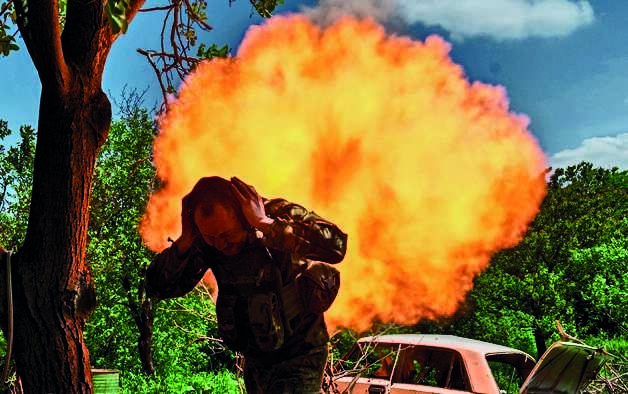A day after blaming Ukraine for a mass drone strike on Moscow, Russia has seized on the aerial assault as an example of what the Kremlin deems a spiraling proxy conflict with Nato. The claims came as Russian authorities said Ukrainian drones had attacked two oil refineries in the Russian region of Krasnodar and that four people had been injured by shelling in a border town in Belgorod, the latest reports of Ukrainian attacks on Russian soil. Also, Russian-installed officials in Ukraine’s Luhansk region – one of four Moscow claims to have annexed – said Ukraine had used US-made Himars rocket launchers to attack a farm in Karpaty village overnight, killing five people and wounding 19. There was no immediate comment from Ukraine.
Some Russian officials on Wednesday seized on comments by American and UK officials on the Moscow strike, saying they were evidence of their governments’ tacit support for Ukrainian military operations inside Russia. Following the drone strike, the UK’s defence secretary James Cleverly said Ukraine has “the right to project force beyond its borders.” The White House’s response was more circumspect, but it also stopped short of criticising the first military strike to have hit civilian areas in the Russian capital since the start of the invasion. “We do not support attacks inside of Russia,” it said, though it noted that Moscow had struck civilian areas in Kyiv for the 17th time .
The Kremlin’s spokesman, Dmitri Peskov, on Wednesday told reporters that Russia “would have preferred to hear at least some words of condemnations” of the drone attack from Western capitals. “We will calmly and deliberately think how to deal with this.” Dmitri Medvedev, the deputy head of Russia’s national security council and a former president, went further, calling the UK “our eternal enemy.” In a post on Twitter, he said the country “de facto is leading an undeclared war against Russia.” by providing Ukraine with military aid and specialists. He said this means that any UK official “can be considered as a legitimate military target.”
Russia has long accused the West of waging a proxy war against it. Those claims grew louder when a group of anti-Kremlin Russian paramilitaries appeared to use US armoured vehicles to stage a raid in Belgorod border region. Russian officials have long said that Nato members’ weapons aid to Ukraine raises the risk of a direct confrontation and a potential nuclear war.
Some Russian officials on Wednesday seized on comments by American and UK officials on the Moscow strike, saying they were evidence of their governments’ tacit support for Ukrainian military operations inside Russia. Following the drone strike, the UK’s defence secretary James Cleverly said Ukraine has “the right to project force beyond its borders.” The White House’s response was more circumspect, but it also stopped short of criticising the first military strike to have hit civilian areas in the Russian capital since the start of the invasion. “We do not support attacks inside of Russia,” it said, though it noted that Moscow had struck civilian areas in Kyiv for the 17th time .
The Kremlin’s spokesman, Dmitri Peskov, on Wednesday told reporters that Russia “would have preferred to hear at least some words of condemnations” of the drone attack from Western capitals. “We will calmly and deliberately think how to deal with this.” Dmitri Medvedev, the deputy head of Russia’s national security council and a former president, went further, calling the UK “our eternal enemy.” In a post on Twitter, he said the country “de facto is leading an undeclared war against Russia.” by providing Ukraine with military aid and specialists. He said this means that any UK official “can be considered as a legitimate military target.”
Russia has long accused the West of waging a proxy war against it. Those claims grew louder when a group of anti-Kremlin Russian paramilitaries appeared to use US armoured vehicles to stage a raid in Belgorod border region. Russian officials have long said that Nato members’ weapons aid to Ukraine raises the risk of a direct confrontation and a potential nuclear war.
